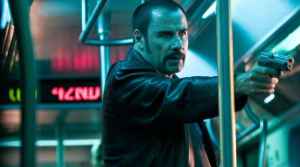- MENU
- HOME
- SEARCH
- WORLD
- MAIN
- AFRICA
- ASIA
- BALKANS
- EUROPE
- LATIN AMERICA
- MIDDLE EAST
- United Kingdom
- United States
- Argentina
- Australia
- Austria
- Benelux
- Brazil
- Canada
- China
- France
- Germany
- Greece
- Hungary
- India
- Indonesia
- Ireland
- Israel
- Italy
- Japan
- Korea
- Mexico
- New Zealand
- Pakistan
- Philippines
- Poland
- Russia
- South Africa
- Spain
- Taiwan
- Turkey
- USA
- BUSINESS
- WEALTH
- STOCKS
- TECH
- HEALTH
- LIFESTYLE
- ENTERTAINMENT
- SPORTS
- RSS
- iHaveNet.com: Movie Reviews

Entire epochs have passed since New York City could plausibly be called "the biggest rathole in the world," a charge made by the subway hijacker played by John Travolta in the shiny, gentrified remake (the second; there was a TV version late last century) of "The Taking of Pelham 123."
But the city really was a rathole in 1974.
The original film version of "Pelham" came out that year, same as "Death Wish." In the post-Watergate era, urban thrillers loved singing that particular song. Draw a line from "The Out-of-Towners" (1970) through Martin Scorsese's masterwork "Taxi Driver" (1976), and you end up with a pencil sketch of a great city barely able to hold it together, provoking -- demanding -- desperate measures in desperate times.
The old "Pelham 123" came straight out of this end-of-the-line era, only it wasn't the end of the line. The city is more sanitary now. Forty-Second Street resembles a mall in suburban New Jersey. There's an Olive Garden in Times Square.
Director Tony Scott's "Pelham" remake is like that Olive Garden. You don't go to either for surprises.
Denzel Washington will be enough for most.
In all sorts of genre thrillers (three of them bearing the slick, shiny Scott imprimatur) he has delivered movie-star-cool performances that somehow never turn movie-star-cold. Washington is that valuable paradox, the relatable supernova.
It's too bad the movie around him isn't better -- the '74 edition, propelled by David Shire's incredibly bad-ass theme music, kicks the remake's behind all the way to Coney Island -- but Washington's easygoing authority compensates for a lot.
From its first iteration as Morton Freedgood's novel, written under the pseudonym John Godey, "Pelham" had simplicity and a ticking clock in its corner.
The '74 film starred Walter Matthau as a New York City transit cop locking horns with hijacker Robert Shaw and his cronies, ranging from ruthless (Hector Elizondo) to sympathetic (Martin Balsam).
With screenwriter Peter Stone supplying the wisecracks, the movie -- loud, fast, abrasively funny -- combined hostage thrills with "I Love/Hate New York" cynicism.
The new "Pelham" exists in a post-racial universe, though Travolta's character, known only as "Ryder," does have a problem with Italians.
Screenwriter Brian Helgeland gets right to it: Ryder and cohorts take over a 6 Train and demand $10 million for release of subway hostages. Washington plays subway dispatcher Walter Garber, tainted by a scandal (he may have taken a bribe, as we learn early on) but good in the clutch. His cat-and-mouse games with Ryder, conducted mostly voice-to-voice behind their respective microphones, are meant to illustrate how these men are two sides of the same tainted coin.
Helgeland co-adapted "L.A. Confidential," which was all about compressing and cutting the source material.
"Pelham" is the opposite: Its narrative is rail-thin, so the task for the screenwriter becomes one of adding the right meat to the bones. This he does only fitfully well. No matter how many times Travolta gets to say the phrase with the same number of syllables as "melon farmer," Ryder never emerges as an interestingly malignant adversary.
"Pelham" leans hard on coincidence, too.
Sharpshooter in the dark, just about to fire ... whoops, rat up the pants leg! Washington popping through a subway grate, just in time to see ... his quarry getting into a cab!
Scott and cinematographer Tobias Schliessler pour on the neon-saturated "Crimson Tide"-brand telephoto closeups, spiced with hyperdramatic freeze-frame effects. He's a reliable hack, but he frames every shot as an isolated dramatic incident, so that individual images rarely develop into a well-sustained action sequence. Because the subway train in "Pelham" stays put for most of the story, the burden shifts to what the characters are yelling at each other. Tricked out with a handlebar mustache that wouldn't be out of place in William Friedkin's "Cruising," Travolta can do only so much with his character's laboriously scripted Catholic guilt.
James Gandolfini portrays the mayor, whose philandering-man-of-privilege biography pulls from the resumes of both Rudy Giuliani and Michael Bloomberg.
John Turturro spits out exposition like a straight-faced pro as an NYPD hostage negotiator, though his final, meaningful glance in the direction of the story's hero is the sort of punctuation only Tony Scott would feel is necessary.
The movie is slick, predictable and, thanks mainly to Washington's canny underplaying, fairly diverting.
It operates on the same principle the dispatcher espouses near the beginning, as the hijackers' plan is set in motion: "extreme caution, per the rule book."
The Taking of Pelham 1 2 3 MPAA rating: (for violence and pervasive language).
Running time: 1:46.
Starring: Denzel Washington (Walter Garber); John Travolta (Ryder); John Turturro (Camonetti); Luis Guzman (Phil Ramos); Michael Rispoli (John Johnson); James Gandolfini (Mayor)
Directed by: Tony Scott; written by Brian Helgeland, based on the novel by John Godey;
Produced by Todd Black, Scott, Jason Blumenthal and Steve Tisch.
A Columbia Pictures release.
The Taking of Pelham 1 2 3 Movie Review - Denzel Washington & John Travolta
© Tribune Media Services